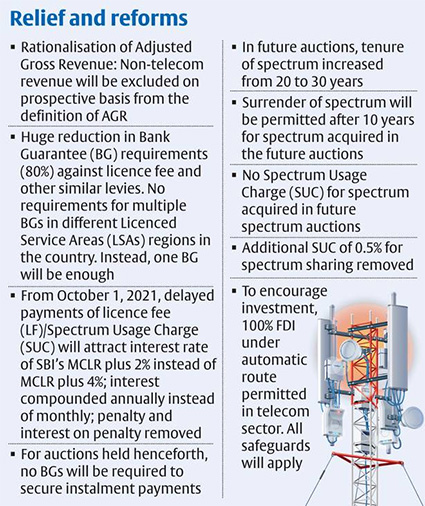Indian Economy
Reforms in Telecom Sector
- 17 Sep 2021
- 6 min read
Why in News
Recently, the Union Cabinet has approved a number of structural and process reforms in the Telecom sector.
- These reforms include a redefinition of the much-litigated concept of Adjusted Gross Revenue (AGR), a four-year moratorium on Telecom Service Providers' (TSPs) dues to the government, among others.
Key Points
- About the Reforms:
- Spectrum Related Reforms: Spectrum auctions will be normally held in the last quarter of every financial year (fixed calendar).
- The future spectrum auctions will be done for a period of 30 years instead of the current 20 years.
- A telco will be allowed to surrender its spectrum after completing a 10-year lock-in period from the date of purchase.
- Spectrum sharing is being encouraged and the additional SUC (Spectrum Usage Charges) of 0.5% for spectrum sharing is removed.
- Spectrum relates to the radio frequencies allocated to the mobile industry and other sectors for communication over the airwaves.
- Rationalization of AGR:
- AGR was previously interpreted as being based on all revenue, rather than just that associated with a company’s core telecom business.
- The government has accepted that this interpretation was problematic, which will reduce the future financial burden on companies.
- Telecom companies have to pay a pre-fixed percentage of AGR (excluding non-telecom revenues) to the government as statutory levies but this will apply prospectively.
- Moratorium on AGR Dues: The earlier definition of AGR, backed by the Telecom Department and upheld by the Supreme Court in 2019, had made telcos liable to pay Rs. 1.6 lakh crore.
- This payment has cash-strapped the telecom sector, which led to the losses of business to telecom companies like Vodafone and established a duopoly (reliance Jio and Bharti Airtel).
- In order to revive the telecom sector, a four-year moratorium on all spectrum and AGR dues has been approved.
- However, those TSPs opting for the moratorium will be required to pay interest on the amount availed under the benefit.
- Interest Rates Rationalized and Penalties Removed:
- The interest which is compounded monthly on the Spectrum Usage Charges (SUC) will now be compounded annually and also the interest rate will be lowered, based on MCLR + 2% instead of MCLR + 4%.
- MCLR refers to the lowest lending rate banks are permitted to offer - the Marginal Cost of funds-based Lending Rate.
- Additionally, the penalty and interest on penalty stand removed.
- The interest which is compounded monthly on the Spectrum Usage Charges (SUC) will now be compounded annually and also the interest rate will be lowered, based on MCLR + 2% instead of MCLR + 4%.
- FDI Reforms: Foreign Direct Investment (FDI) in the sector has also been allowed up to 100% under the automatic route, from the existing limit of 49%.
- Spectrum Related Reforms: Spectrum auctions will be normally held in the last quarter of every financial year (fixed calendar).
Adjusted Gross Revenue
- AGR is a fee-sharing mechanism between the government and the telcos who shifted to the 'revenue-sharing fee' model in 1999, from the 'fixed license fee' model.
- In this course, telcos are supposed to share a percentage of AGR with the government.
- Under this, mobile telephone operators were required to share a percentage of their AGR with the government as annual License Fee (LF) and Spectrum Usage Charges (SUC).
- In 2005, Cellular Operators Association of India (COAI) challenged the government’s definition for AGR calculation.
- The companies claimed that AGR should comprise just the revenue accrued from core services and not dividend, interest income or profit on the sale of any investment or fixed assets.
- The Supreme Court upheld the definition of AGR as stipulated by the DoT (revenues from both telecom and non-telecom services) in October 2019.
- Significance of these Reforms:
- Reviving Competition: Four years’ Moratorium would encourage companies to invest in customer service and new technology.
- Promoting Ease of Doing Business: The allowance of 100% FDI in the sector (through the automatic route) came shortly after the government decided to scrap a controversial retrospective tax.
- Together, these signal the return to an investor-friendly climate.
- Promoting Digital India: The telecom sector is one of the prime movers of the economy and the measures announced by the government would enable the industry to achieve the goals of Digital India.
- Further Technological Advancement: Together, these measures would pave the way for large scale investments into the sector, including for 5G technology deployment, and generate more jobs.
Way Forward
Moratorium on AGR dues and spectrum dues would only provide temporary relief with these deferred dues to be payable eventually with interest. Thus, all the stakeholders involved should find a way to develop a sustainable tariff policy.







